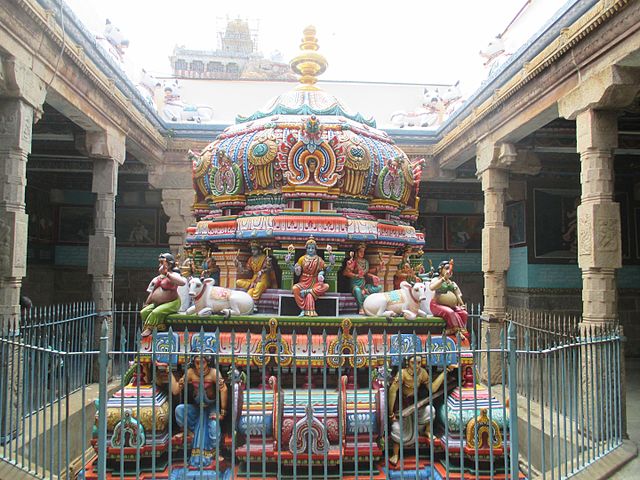Shiva: He who became Mother

Shiva: He who became Mother
[ad_1]
 |
| Thaaymaanavar Temple (Image Credit: Sriram) |
Today, when I left for the office, I had no idea that I would soon be swept up in a heartwarming tale, one that would challenge my preconceived notions and leave an indelible mark on my heart.
Settling into my seat on the 7:30 EMU, my attention was drawn to a Kinner, a member of the transgender community, gracefully making her way through the train car. She was tying rakhis on passengers’ wrists. Initially, skepticism crept into my thoughts, and I couldn’t help but wonder if this was another money-grabbing scheme. But when she approached me, my concerns found a voice.
I protested, attempting to voice my doubts, but by the time my words escaped my lips, she had already placed a sacred tikka on my forehead. She looked into my eyes with unwavering sincerity and assured me, “Don’t worry, I won’t ask for money.” In that moment, her words disarmed my skepticism, and a genuine smile effortlessly crossed my face. Our conversation began.
We delved into various topics, from movies and web-series to the inspiring story of Gauri Sawant. In the midst of our exchange, Ragahav whatsapped me a picture from a temple in Tiruchirappalli. It was here that my newfound sister, Lakshmi, recognized the temple of Thaaymaanavar.
Lakshmi shared the significance, saying, “Thaaymaanavar means ‘He who became Mother,’ an epithet used for Lord Shiva.”
As the EMU was running as usual on Indian Railway Time, she narrated me the story of Thaaymaanavar. She began by clearing her throat and adjusting her floral pattern sari.
In a time long ago, in a town nestled along the banks of the majestic river Kaveri, lived a devoted mother and her daughter, Rathnavathi. Both were ardent worshippers of Lord Shiva, their faith unwavering. Rathnavathi eventually married and moved across the river to her husband’s home, but the bond between mother and daughter remained unbreakable. They frequently visited each other, crossing the river by boat
One momentous day, Rathnavathi shared the joyous news that she was expecting her first child. Excitement filled the family as they eagerly awaited the arrival of the newborn.
“Amma,” Rathnavathi exclaimed with gratitude, “I’m so glad you will be here to assist with my delivery!”
As time passed, Rathnavathi’s pregnancy progressed, and the weather turned tumultuous. Then, the inevitable occurred. Labor pains gripped Rathnavathi, and she urgently requested someone to fetch her mother. She hoped Amma would arrive in time to help.
Outside, the heavens opened up, drenching the town in heavy rain. Rathnavathi’s cries of pain echoed through the storm. Her contractions intensified, but her mother had not yet arrived.
In despair, Rathnavathi cried out, “I need my mother now!” She whispered a frantic prayer.
Then, a soothing voice whispered in her ear, “Your mother is here.”
Relief washed over her like a gentle rain shower. Rathnavathi believed her mother had braved the storm to reach her side. Her mother’s calming presence eased her anguish.
“I’ve come, my dear. Everything will be alright now,” her mother reassured her.
In the midst of the tempest, Rathnavathi gave birth to a healthy child, the room filled with the cries of the newborn. Both mother and baby were safe and sound.
Overwhelmed with gratitude, Rathnavathi turned to her mother, tears of joy streaming down her face, “Thank you, Amma, for coming just in time. I wouldn’t have been able to do this without you!”
Then, a knock echoed at the door, and someone entered. Rathnavathi could scarcely believe her eyes. It was her mother, her real mother!
Confusion engulfed Rathnavathi. She turned to the woman who had helped with the delivery, but she had vanished into thin air.
“I apologize for not being here on time,” her mother said, her voice tinged with sorrow. “The river was in spate, and no boat could cross. I came as soon as the floodwaters receded.”
Rathnavathi was dumbfounded, her mind unable to comprehend the mystery that had unfolded before her.
“If you’ve just arrived, then who was here before you?” she stammered.
The town buzzed with the search for the enigmatic woman, but no one could identify her. She had vanished, leaving behind only the memory of her divine presence.
And then, the realization struck like a bolt of lightning. Lord Shiva himself had assumed the form of Rathnavathi’s mother to assist with the delivery.
Lakshmi concluded, “From that day onward, he was worshipped as ‘Thaaymaanavar.’ He who became the mother.
In evening, on my return journey, I could not find Lakshmi, but her story of Thaaymaanavar stucked with me. It reminded me that divinity transcends all boundaries, including those of gender. People visit a male diety to pray for the safe delivery of their daughters.
[ad_2]




